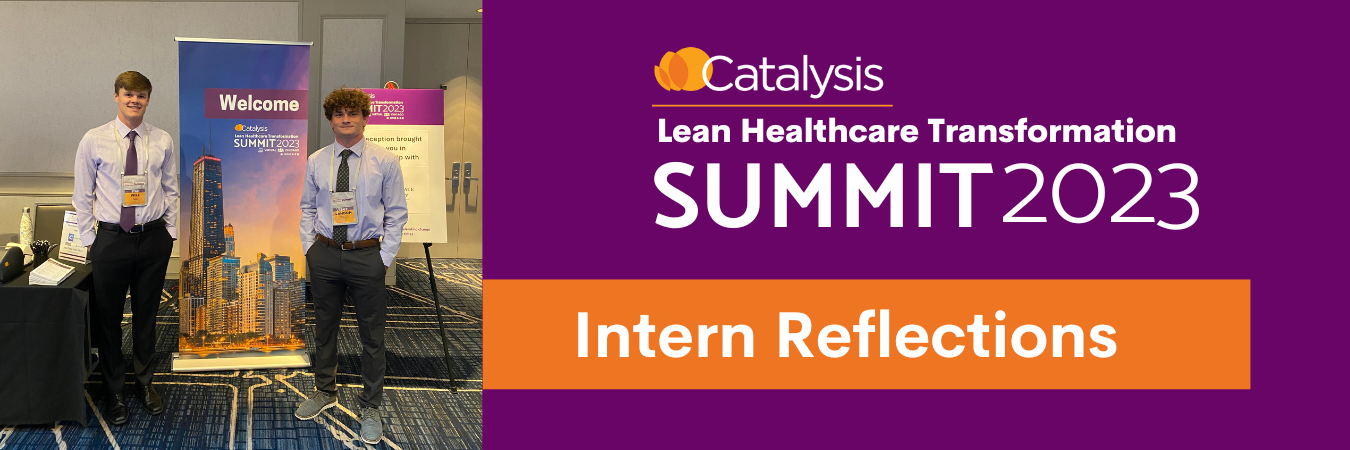Catalysis Summit Reflection

Catalysis’ internship program gives college students the opportunity to attend our annual Lean Healthcare Transformation Summit, learn about lean in healthcare, and make valuable connections to healthcare leaders and practitioners. We see this program as one way to invest in the future of healthcare by educating and connecting the next generation of healthcare leaders. This blog is from one of our interns, Will Bickel (pictured left).
Going into the Catalysis Summit I was not sure what to expect, however, I had two personal goals of what I wanted to get out of the experience. I wanted to have conversations with as many healthcare professionals as possible and develop my leadership skills. Both of these goals are important to me as I look to explore the healthcare field as a potential career and I want to continue growing as a leader.
The Summit exceeded my expectations and was an amazing learning experience. I was able to learn about the lean business model and how it can be implemented in hospitals, participate in a workshop on how to be a more effective leader and connect with professionals within healthcare management. This provided me with concepts and principal ideas that I will implement in my own life.
I went into the Summit having read multiple articles on the lean business model, however it seemed too simple and obvious to work in a complex system like our hospitals. Throughout the Summit I was exposed to the benefits of this model and saw a variety of data supporting its effectiveness. These two things have me convinced that it’s the way to go. The practice from this model that stuck out to me the most is that you need to listen to your frontline workers. I learned that oftentimes management does not have the answers but instead, the workers do. This is because they are closest to the patient care that is being provided. Subsequently, they are aware of the solutions to problems but they are not in a position with enough influence to fix them. Through lean principles, management can create frequent interactions with these workers where they can listen to their solutions and experiment with implementing them in practice. To do this I learned that it is also crucial for leaders to have humility and realize they don’t always have the answers. I believe that humility and listening to frontline workers are universal concepts. For this reason, I plan on including them in my current and future leadership roles.
The first day we had the opportunity to participate in a small group breakout session. The focus in this room was creating a more productive work environment as a manager. The first takeaway that I retained from this workshop is that transparency as a leader is of the utmost importance. In a time of change, a leader is likely to know the current state of what is going on, however, those further down the chain of command are likely confused. As a leader, open and frequent communication can help provide clarity. We also discussed how to deal with resistance to change as a leader. This is where I had my second key takeaway, meet people where they are. It is important to realize that everyone is at a different place in their transformation journey. Being able to identify where employees are hitting a roadblock in their transformation is important as you can then help coach them to the next step in their journey.
While I enjoyed the breakout rooms and coaching sessions my favorite part of the Summit was by far the interactions I had with those around me. Being able to talk to healthcare professionals who are at more developed stages in their careers was very beneficial to me. I was able to gain a better understanding of what it means to be in healthcare management and was gifted many pieces of advice. I found that the people I was surrounded by were genuinely kind and interested in what I was doing with my own life. The conversations were very two-sided as I was not only asking questions but answering many about my current involvement in college and my personal life. This in particular made me feel very welcomed during my time at the Summit.
I achieved both my initial goals and left with even more knowledge than I could have expected. The leadership advice that resonated with me the most is that a leader should act as a coach who is there to foster growth, not a manager who is telling people what to do. I left this event even more interested in healthcare management and feeling like I can better perform in my leadership roles.
Related Items








Leave a Reply